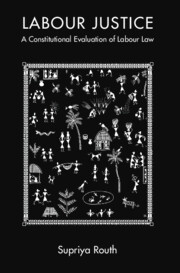Book contents
- Frontmatter
- Dedication
- Contents
- Preface
- Acknowledgements
- Introduction: The Law of Labour—Evaluating the Labour Law Reforms
- 1 Labour’s Constitution: Pursuing Economic, Social and Political Justice
- 2 Individual Autonomy, Freedom of Contract and the Labour Market
- 3 Solidarity and Social Welfar
- 4 Industrial Democracy and Republican Citizenship: Collective Action in Resource Redistribution
- Conclusion: Realising Labour Justice
- Bibliography
- Index
4 - Industrial Democracy and Republican Citizenship: Collective Action in Resource Redistribution
Published online by Cambridge University Press: 30 April 2024
- Frontmatter
- Dedication
- Contents
- Preface
- Acknowledgements
- Introduction: The Law of Labour—Evaluating the Labour Law Reforms
- 1 Labour’s Constitution: Pursuing Economic, Social and Political Justice
- 2 Individual Autonomy, Freedom of Contract and the Labour Market
- 3 Solidarity and Social Welfar
- 4 Industrial Democracy and Republican Citizenship: Collective Action in Resource Redistribution
- Conclusion: Realising Labour Justice
- Bibliography
- Index
Summary
Introduction
The Constitution of India specifies the subject matter of distribution (social goods or the measuring standard of social justice) – consisting of individual freedoms (Part III) and material resources (Part IV) – in furtherance of the social justice agenda. While the Constitution equally safeguards individual freedoms of all citizens, it does not specify a rule – a method – for the redistribution of material resources except for noting that ‘weaker sections’ of the population should receive ‘special care’ as the state seeks to minimise and eliminate inequalities. With this general guidance, the Constitution leaves the specific rule of redistribution to be determined through the political ‘governance’ process. This approach to redistribution means that constitutionally mandated redistribution must take place through direct citizen participation in governance. Participatory democracy, as the third component of the social justice agenda, is particularly appropriate as a basis for a redistributive framework given the nation's exceptionally diverse and large population. Operationalising a specific, singular, functional redistributive method, albeit with contextual modifications, is bound to be difficult, if not impossible, for a country as heterogeneous as India. The Constitution subjects redistributive entitlements to a participatory decision-making process to make room for contextual sensitivity in diverse circumstances.
Liberal theories of justice based on individual autonomy widely recognise the significance of this process in shaping the nature of the economy (and polity). The role of democratic deliberation in workplaces has been underscored from the perspectives of workplace democracy and workplace republicanism. Workplace democracy sees participatory decision-making as the right to collective governance of enterprises, and workplace republicanism defines it as a worker's right to contest arbitrary management decisions. It is, thus, argued that democracy in workplaces is important in both conferring control of productive assets on workers and protecting them from the management's caprices. These perspectives emphasise the participatory process operating within the capitalist relations of production based on private contract and property relationships and are thereby consistent with the Indian Constitution's scheme of social justice. As noted earlier (in Chapter 1), the Constitution conceives of worker-citizens as autonomous self-interested actors in market exchanges. The Constitution supports the foundation of this mode of market participation without interfering in the outcome of individual exchanges.
- Type
- Chapter
- Information
- Labour JusticeA Constitutional Evaluation of Labour Law, pp. 135 - 169Publisher: Cambridge University PressPrint publication year: 2024

